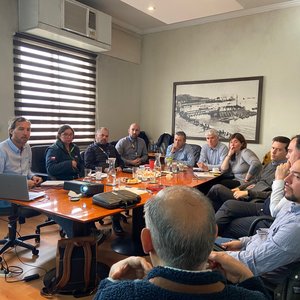Using Baltic Sea fish in local aquafeed would enable the recycling of marine nutrients and eliminate the need for fish feed imports. This is one of the recommendations jointly drawn up by the Finnish Game and Fisheries Research Institute and the Finnish Environment Institute for the promotion and coordination of fishing, fish farming and other methods of exploiting the marine environment and resources in the Archipelago Sea.
The two institutes conducted a case study on the sustainable use of the Archipelago Sea under the EU-funded COEXIST project - Interaction in European coastal waters: A roadmap to sustainable integration of aquaculture and fisheries.
The Finnish Game and Fisheries Research Institute and the Finnish Environment Institute drew up six sustainability recommendations for the Archipelago Sea.
The six recommendations are:
1.Fish farms start using fish feed produced from the Baltic Sea\'s raw materials, and receive support through an incentive system, such as higher production volumes.
2.The national planning control for future fish farms is put into practice and taken account of in the environmental permit process.
3.Maritime spatial planning (MSP) should be developed through regional cooperation.
4.Fishers are encouraged to engage in low-value fish extraction and financial support is provided for such activities.
5.Removal of nutrients through low-value fish extraction is made a compensation payment option in the licensing of fish farms.
6.A functional and acceptable management strategy is promoted through multi-partner collaboration and coordination of goals.
These recommendations benefit all kinds of marine use. Regional fish farm planning control that benefits all parties helps reduce conflicts with other users of the water body. Planning control can be used to integrate one owner\'s fish farms into larger facilities. This would reduce the number of fish farms in the Archipelago Sea by up to 60%. It would also mean that the number of summer cottages located closer than 500 metres from a fish farm would come down by more than 80%. The profitability of fish farming would also improve, because larger facilities have lower production costs.
The study also involved comparing the Finnish and Swedish management and planning systems for fish farming. Both countries have been enforcing a strict environmental policy which has restricted production. In recent years, however, Swedish fish farmers have been allowed to increase production, and Finnish farmers have started transferring their operations to Sweden. This shows that the strict Finnish licensing procedure has driven production, employment opportunities and environmental effects to other parts of the Baltic Sea\'s catchment area.
The study revealed that, throughout the licensing process, there is more interaction between Swedish fisheries industry authorities and fish farming license applicants than in Finland, which is reflected in the content of licensing decisions as more wide-ranging consideration of perspectives specific to the fisheries industry. On the other hand, the increased cross-sectoral interaction of Finnish government sectors concerning the planning control of future fish farms is indicative of a more acceptable and comprehensive management strategy for fish farming that will benefit the environment and society as well as the fisheries industry.










